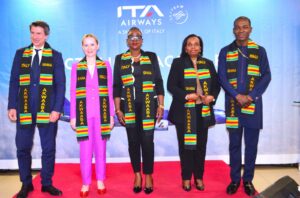Ghana is no doubt a major tourism destination, not only in Africa but in the world as a whole. The country is endowed with rich and enviable tourism resources. These resources include castles, forts, museums, national parks, natural resource reserves, beautiful beaches, rich traditional culture, festivals, and hospitable people.
The country is recognized and endorsed by the United Nations World Tourism Organization (UNWTO) as a preferred destination in Africa.
Currently, the tourism sector is the fourth largest foreign exchange earner for the country and the potential exists for the sector to be the topmost foreign exchange earner, if conscious and concerted effort is made by all the stakeholders to realise this goal.
It is becoming evident that the development of the sector over the past years has led to phenomenal upsurge of hotels, hostels, restaurants, nightclubs, event centres, entertainment centres, charter flights, travel and tour companies, and car rental companies.
Indeed, there is now the full range of hotel ratings, from budget to five-stars in the country, especially, with high concentration in Accra, Kumasi, and Takoradi. This buttress the fact that tourism and hospitality are inseparable.
One of the key expectations of the guests is quality service delivery and the question is: are the guests at our various tourism establishments provided the requisite quality service in order to maintain Ghana on the world’s tourism map? The truth is that stakeholders have no choice but to remain committed to making quality service a cornerstone in their quest to provide memorable services, knowing very well that their industry is a highly competitive one.
Tourists will certainly move to other countries or destinations if they are not satisfied with the quality of service delivered to them in Ghana.
What then is quality service? We can describe quality service as that type of service that meets or exceeds the expectations of a guest and thereby leaving a lasting memory on his or her mind. Such a service will compel the guests to ask for more and stay longer at the destination.
Examples of quality service include: operating within clean and neat environment, warm welcome at front desks, staff wearing appropriate uniforms and name tags, well –functioning equipment and gadgets, skills and professionalism in various departments of the industry, and excellent travel arrangements.
The next concern is: how is quality service being delivered in Ghana’s tourism sector. Candidly, the delivery of quality service must assume a stakeholder approach. The tourism sector is highly social and fragmented. There is the need for all the key players to unite and be committed to the agenda of providing services that exceed the expectations of their guests.
These stakeholders include the guests, the tourism enterprise operators, tourism trade associations, the Ghana Tourism Authority, the Ministry of Tourism, Arts, and Culture, and academia.
Guests at the various tourism facilities in the country are of key importance. In fact, they are the raison d’etre of the tourism businesses. The needs and expectations of guests must be clearly ascertained and catered for. As the target markets, it is necessary for them to clearly articulate their needs, wants, and expectations to the tourism facility operators. For example, a guest at restaurant must not be forced to settle for a sparkling wine, when his or her thirst is for a bottle of champagne.
It is generally said that businesses exist because of their customers. Thus, in their quest to deliver quality service, it is of utmost importance that the tourism facility operators conduct market research to identify the expectations of their market. For example, the needs and expectations of a guest at a budget hotel may differ from that of a guest at a five-star hotel.
Of equal importance is the training of workers in the industry on regular basis. There is no guarantee for quality service delivery if the employees in the country’s tourism sector do not have the requisite cutting-edge knowledge, skills, and abilities.
The various trade associations such as the Ghana Tourism Federation, the Ghana Hotels Association, the Tour Operators Union of Ghana, and the Car Rental Association of Ghana, among others must be committed to championing the course of quality service delivery. It is well known that the country’s tourism product is not all that different from that of other major tourism destinations and competitors in the West African sub-region.
Adding value to the existing national tourism products and having an unbeatable passion towards excellent service delivery are what will keep the country at the forefront of tourism destinations in the world.
Furthermore, the country’s academic institutions have a pivotal role to play in ensuring quality service delivery. As centres of knowledge and excellence, it is expected that graduates from these institutions are adequately trained to deliver on the job. It can be suggested that the curriculum for teaching and training the student must emphasize the need for industrial attachments and exposure.
The country’s tourism sector requires professionals in order to meet and exceed the expectations of its guests. In the same vein, it is necessary for both academia and industry practitioners to regularly meet and exchange views on the current and emerging trends in the tourism sector.
Another key player in ensuring quality service delivering in the nation’s tourism space is the Ghana Tourism Authority. The Ghana Tourism Authority has the mandate to regulate the tourism sector via registration, inspection, licensing, and classification of the tourism and hospitality enterprises in the country. It is also responsible for the marketing and promoting the country as a tourism destination.
The required standards to guide and guarantee quality service are clearly stated in such legislative instruments as Tourism (Registration and Licensing of Tourist Accommodation Enterprise) Regulations, 2016(L.I. 2239); Tourism (Registration and licensing of Food, Beverage and Entertainment Enterprise) Regulations,2016(L.I. 2238); Tourism (Tourist Sites) Regulations, 2019(L.I. 2393); and Tourism (Travel Trade Enterprise Registration and licensing) Regulations,2019(L.I.2389).
As part of its function, the Ghana Tourism Authority implements and ensures compliance with the standards contained in the aforementioned legislative instruments; grant licenses for the tourism industry, regulates and supervises tourism enterprises; regulates and monitors the activities of licensees; investigate and takes measures to eliminate illegal, dishonourable, unsound, and improper activities in relation to any activity regulated under the TOURISM ACT, 2011 (ACT 817).
In view of the phenomenal increase in the number of tourism enterprises across the country, the Ghana Tourism Authority must be provided with adequate resources (material, human, and financial) to carry out its oversight role.
It is equally important that efforts are enhanced to effectively decentralise the administration and operations of the industry regulator; that is, more of its district offices need to be opened. The ultimate goal is to ensure that the guests at the various tourism facilities are provided the best of services and experiences they so desired.
Herein lies the strategic importance and role of the Ghana Tourism Authority. In the same breadth, it is natural to look up to the sector Ministry (the Ministry of Tourism, Arts, and Culture) for sound policies and programmes that will make the quest for quality service delivery a reality.
For example, a policy that directs all those who intend to work in the accommodation, food, beverage and entertainment and travel trade enterprises must be trained and certified by a recognised national body will be more than appropriate.
Without a shadow of doubt, the success of the country’s tourism development Agenda (National Tourism Development Plan, 2013-2027) hinges on a concerted and deliberate effort that ensures that guests at the country’s tourism enterprises are provided facilities and services that exceed their expectations. Nothing will sell Ghana as the topmost tourism destination in the world than the words and memories of those guests who visited our shores. Yes, memories sell, quality memories do it best!!!!
The writer, Shine Dela Gowonu is a Senior Standards and Quality Assurance Officer at the Greater Accra Regional Office of the Ghana Tourism Authority.








